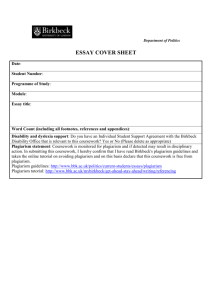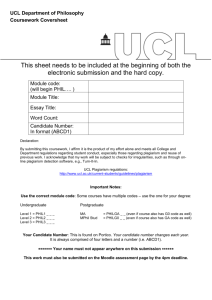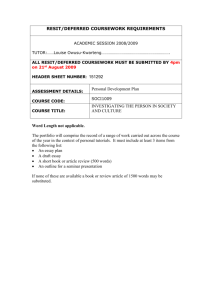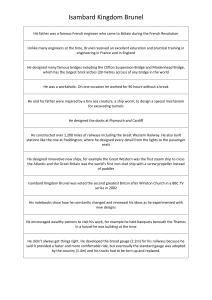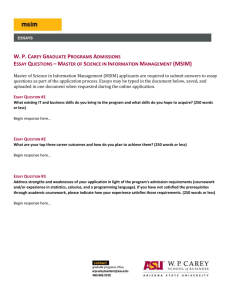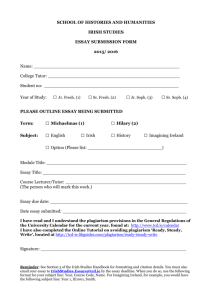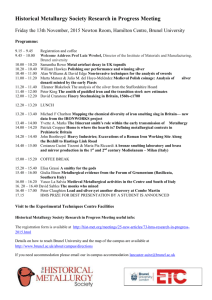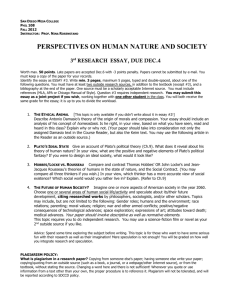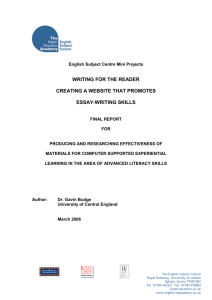PP3014-india-module-2014-15
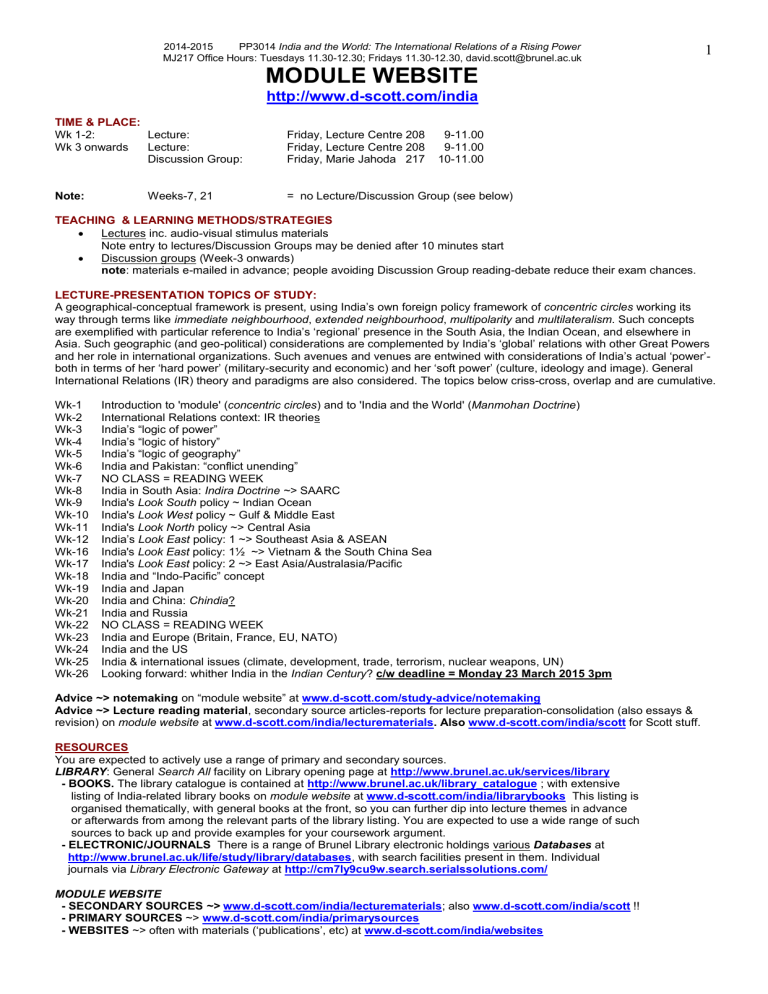
2014-2015 PP3014 India and the World: The International Relations of a Rising Power
MJ217 Office Hours: Tuesdays 11.30-12.30; Fridays 11.30-12.30, david.scott@brunel.ac.uk
1
MODULE WEBSITE http://www.d-scott.com/india
TIME & PLACE:
Wk 1-2: Lecture:
Wk 3 onwards Lecture:
Discussion Group:
Friday, Lecture Centre 208 9-11.00
Friday, Lecture Centre 208 9-11.00
Friday, Marie Jahoda 217 10-11.00
Note: Weeks-7, 21 = no Lecture/Discussion Group (see below)
TEACHING & LEARNING METHODS/STRATEGIES
Lectures inc. audio-visual stimulus materials
Note entry to lectures/Discussion Groups may be denied after 10 minutes start
Discussion groups (Week-3 onwards) note : materials e-mailed in advance; people avoiding Discussion Group reading-debate reduce their exam chances.
LECTURE-PRESENTATION TOPICS OF STUDY:
A geographical-conceptual framework is present, using India’s own foreign policy framework of concentric circles working its way through terms like immediate neighbourhood , extended neighbourhood , multipolarity and multilateralism . Such concepts are exemplified with particular reference to India’s ‘regional’ presence in the South Asia, the Indian Ocean, and elsewhere in
Asia. Such geographic (and geopolitical) considerations are complemented by India’s ‘global’ relations with other Great Powers and her role in international organizations. Such avenues and venues are entwined with considerations of India’s actual ‘power’- both in terms of her ‘hard power’ (military-security and economic) and her ‘soft power’ (culture, ideology and image). General
International Relations (IR) theory and paradigms are also considered. The topics below criss-cross, overlap and are cumulative.
Wk-1 Introduction to 'module' ( concentric circles ) and to 'India and the World' ( Manmohan Doctrine )
Wk-2 International Relations context: IR theories
Wk-3
India’s “logic of power”
Wk-4 India’s “logic of history”
Wk-5
India’s “logic of geography”
Wk-6 India and Pakistan: “conflict unending”
Wk-7 NO CLASS = READING WEEK
Wk-8 India in South Asia: Indira Doctrine ~> SAARC
Wk-9 India's Look South policy ~ Indian Ocean
Wk-10 India's Look West policy ~ Gulf & Middle East
Wk-11 India's Look North policy ~> Central Asia
Wk-12
India’s
Look East policy: 1 ~> Southeast Asia & ASEAN
Wk-16 India's Look East policy: 1½ ~> Vietnam & the South China Sea
Wk-17 India's Look East policy: 2 ~> East Asia/Australasia/Pacific
Wk-18 India and “Indo-Pacific” concept
Wk-19 India and Japan
Wk-20 India and China: Chindia ?
Wk-21 India and Russia
Wk-22 NO CLASS = READING WEEK
Wk-23 India and Europe (Britain, France, EU, NATO)
Wk-24 India and the US
Wk-25 India & international issues (climate, development, trade, terrorism, nuclear weapons, UN)
Wk-26 Looking forward: whither India in the Indian Century ?
c/w deadline = Monday 23 March 2015 3pm
Advice ~> notemaking on “module website” at www.d-scott.com/study-advice/notemaking
Advice ~> Lecture reading material , secondary source articles-reports for lecture preparation-consolidation (also essays & revision) on module website at www.d-scott.com/india/lecturematerials . Also www.d-scott.com/india/scott for Scott stuff.
RESOURCES
You are expected to actively use a range of primary and secondary sources.
LIBRARY : General Search All facility on Library opening page at http://www.brunel.ac.uk/services/library
- BOOKS.
The library catalogue is contained at http://www.brunel.ac.uk/library_catalogue ; with extensive
listing of India-related library books on module website at www.d-scott.com/india/librarybooks This listing is
organised thematically, with general books at the front, so you can further dip into lecture themes in advance
or afterwards from among the relevant parts of the library listing. You are expected to use a wide range of such
sources to back up and provide examples for your coursework argument.
- ELECTRONIC/JOURNALS There is a range of Brunel Library electronic holdings various Databases at http://www.brunel.ac.uk/life/study/library/databases , with search facilities present in them. Individual
journals via Library Electronic Gateway at http://cm7ly9cu9w.search.serialssolutions.com/
MODULE WEBSITE
- SECONDARY SOURCES ~> www.d-scott.com/india/lecturematerials ; also www.d-scott.com/india/scott !!
- PRIMARY SOURCES ~> www.d-scott.com/india/primarysources
- WEBSITES ~> often with materials (‘publications’, etc) at www.d-scott.com/india/websites
2014-2015 PP3014 India and the World: The International Relations of a Rising Power
MJ217 Office Hours: Tuesdays 11.30-12.30; Fridays 11.30-12.30, david.scott@brunel.ac.uk
ASSESSMENT
2000 words
Written Examination
(discursive essay, 50% weighting) 24 March 2015, 3 pm
( 2 hours, two questions, 50% weighting) April/May 2015
Advice: Use, refer and apply general IR theory/theories to your coursework & exam.
2
Essay titles:
1. How much continuity and much change does India’s new Prime Minister Narendra Modi represent for Indian foreign policy?
2. How “powerful” is India?
3.
“The Indian subcontinent as India’s subcontinent
, the Indian Ocean as
India’s ocean “. Discuss.
4. Why and how does China crop up so frequently across a module on “India and the World. The International Relations of a Rising Power”?
5. How problematic have been, and are, India’s relations with the other Great Powers?
6. How problematic have been, and are,
India’s relations with the Islamic world?
7. How far does India ’s stress on strategic autonomy and its sovereignty sensitivities affect India’s foreign policy?
8.
How substantial is India’s involvement with other regional organisations?
9. How far has India pursued successful maritime power projection and successful maritime diplomacy?
10
. “There has been talk of IR (international relations) theory not only being Western in origin but Western in
application and relevance, rather than being universal and potentially applicable to India”. Discuss, with
special reference to how far IR theory (or particular theories) does, or does not, shed light on India’s foreign policy and international relations.
Note : None of these titles reflect one lecture, so do n’t just depend on a tailor-made lecture for your essay. Instead prepare before & after any relevant lectures, and look out for overlaps & recurrences of themes across various lectures. The late date given for submission is to enable (A) your thorough research & preparation of materials during terms 1-2; and (B) your general deepening of knowledge & links within the module, as its structure cumulatively reinforces topics week by week.
Features that are looked for in essays
Comprehension of the issues involved
Evidence of wide reading
Primary sources combined with academic secondary sources
Relevance of material used, i.e. capacity to furnish an answer to the question asked
Structure and organisation of essay
Evidence of ability to relate factual material to appropriate theoretical models & interpretations
Ability to avoid factual errors
Clarity of expression and writing style
Ability to sustain an argument or interpretation, where appropriate
Grammar and spelling
Use of appropriate academic conventions (i.e., referencing, footnotes, etc.)
Ability to avoid “poor academic practice” (and plagiarism)
Advice ~> more on coursework tips at www.d-scott.com/study-advice/essay-writing
Good academic practice & plagiarism:
Full referencing, particularly of any quote, is always essential, for clarity and to avoid plagiarism. Material used, i.e. other people’s words or substance, but not acknowledged by you is at best “poor academic practice” and at worst deliberate plagiarism. “Poor academic practice” inevitably gets poor academic marks, whilst “plagiarism” gets zero marks and possible disciplinary procedures. A student was expelled this summer for plagiarism committed on PP2011 last year. Advice on referencing ~> www.d-scott.com/study-advice/essay-writing
Submission of coursework
One hard copy to be submitted to the Undergraduate staff (Marie Jahoda Building, MJ Centre) & one electronic copy to be submitted via Blackboard Learning’s PP3014 module page ‘Assignments’. Both copies are needed.
Note : Requests for essay extensions are not dealt with by Module Lecturers, but by the Undergrad staff in the MJ Centre.
Written examination
Examination questions can be from within the module title in general, and within the Lecture Topics of Study outlined above.
The exam will be based on lecture-presentations , discussion group materials
, and your expected “ general reading
” around the subject. You should be familiar with all three elements, through your active involvement in the module. Non-attendance at
Discussion Groups and Lectures will inevitably reduce your chances of success. You are expected to be deepening your knowledge throughout the year.
For exam questions there will be a past paper made available on the module website in late Spring term, which can be used for question analysis of style. This previous exam paper will be of no use for any “question spotting/prediction” attempts, the particular topics on it may or may not be similar to this year’s exam paper; which, to repeat, “ can be from within the module title in general & within the range of topics outlined above ”. There will not be any list given of recommended exam topics to revise, nor any special exam revision session run. More general exam advice ~> www.d-scott.com/study-advice/exams .
